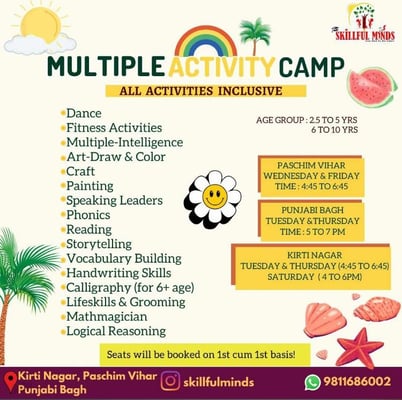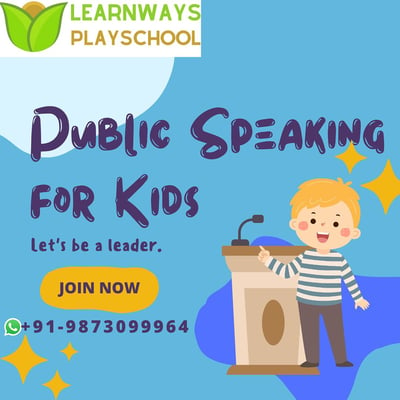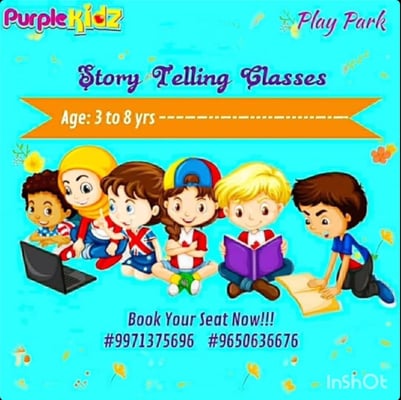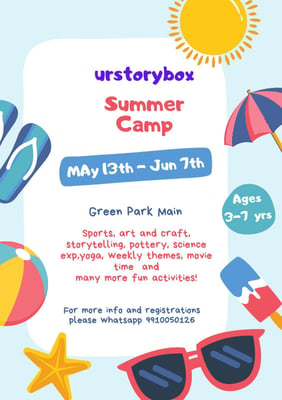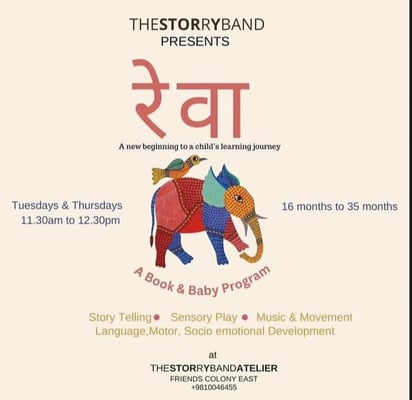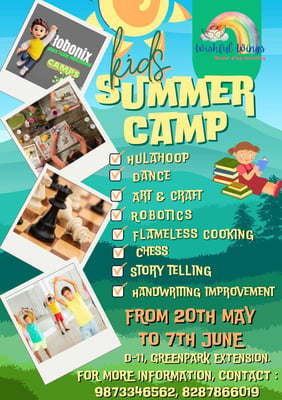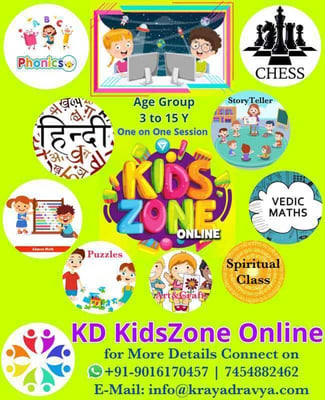Story Telling classes for Kids - 61 options found
Storytelling classes for children aged 2 to 15 offer numerou... Storytelling classes for children aged 2 to 15 offer numerous benefits, including stimulating brain development, fostering language acquisition, promoting creativity and imagination, enhancing social-emotional skills, preparing for academic success, and offering enhanced career opportunities. These classes expose children to diverse stories, cultures, and perspectives, encouraging empathy, critical thinking, and communication skills. From developing language proficiency to nurturing cultural awareness, storytelling classes empower children to become confident communicators and lifelong learners. Through engaging and interactive storytelling experiences, children explore the power of narrative and storytelling, laying the foundation for personal and academic success. Read more
skillful minds-multiple activities camp
icon nurturing innocence-summer camp
purple kidz play park-weekly classes
learnways playschool-public speaking for kids
purple kidz - story telling classes
art house studio-kids summer camp
ur storybox-summer camp
purple kidz - all in one class
the storyband-a book & baby program
wishful wings-kids summer camp
the learning years-kids summer camp
hangin-the big jumble
purplekidz-offline classes
panchshila montessori school-4 summer camp programs for children
Advantages of Storytelling Classes for Children Ages 2 to 15
Introduction
Storytelling classes offer children aged 2 to 15 an enriching and imaginative way to explore language, creativity, and communication skills through the art of storytelling. These classes provide numerous benefits, including stimulating brain development, fostering language acquisition, promoting creativity and imagination, enhancing social-emotional skills, and preparing children for future academic and career success. In this guide, we will explore the advantages of storytelling classes for children in this age range, along with addressing potential limitations and common questions.
Advantages
-
Stimulation of Brain Development:
- Language Skills: Storytelling classes expose children to rich language experiences, including vocabulary, syntax, and grammar. Engaging with stories stimulates language processing areas of the brain, enhancing linguistic abilities and laying the foundation for literacy development.
- Cognitive Skills: Listening to and retelling stories requires cognitive skills such as memory, attention, and sequencing. Storytelling classes challenge children's cognitive abilities, stimulating brain development and improving cognitive function.
-
Language Acquisition:
- Vocabulary Development: Exposure to a variety of stories introduces children to new words and concepts, enriching their vocabulary and language comprehension skills. Actively engaging with stories through discussion and reflection reinforces vocabulary acquisition.
- Language Fluency: Storytelling classes provide opportunities for children to practice speaking and listening skills in a supportive and interactive environment. Regular participation in storytelling activities improves language fluency and communication abilities.
-
Promotion of Creativity and Imagination:
- Creative Expression: Storytelling allows children to express themselves creatively through narrative, character development, and plot construction. They have the freedom to invent and explore imaginary worlds, fostering creativity and imagination.
- Empathy and Perspective-Taking: Engaging with diverse characters and narratives promotes empathy and perspective-taking skills as children learn to understand and relate to different experiences and points of view.
-
Enhancement of Social-Emotional Skills:
- Emotional Literacy: Stories often explore themes of emotions, relationships, and moral dilemmas, helping children develop emotional literacy and empathy. Discussing characters' feelings and actions promotes emotional intelligence and self-awareness.
- Social Skills: Storytelling classes encourage collaboration, turn-taking, and active listening, fostering social skills such as communication, cooperation, and empathy. Group storytelling activities promote a sense of community and belonging among participants.
-
Cultural and Historical Awareness:
- Cultural Diversity: Storytelling exposes children to diverse cultures, traditions, and perspectives from around the world. Learning about different cultures through stories promotes cultural awareness, tolerance, and appreciation of diversity.
- Historical Context: Historical stories and folklore provide insight into past events, traditions, and customs, enriching children's understanding of history and the world around them.
-
Preparation for Academic Success:
- Literacy Skills: Storytelling lays the foundation for literacy development by fostering a love of reading and an appreciation for language. Children who are exposed to storytelling from an early age are more likely to become proficient readers and writers.
- Critical Thinking Skills: Analyzing and interpreting stories encourages critical thinking skills such as inference, prediction, and evaluation. Storytelling classes promote higher-order thinking skills and intellectual curiosity, preparing children for academic success.
-
Enhanced Career Opportunities:
- Communication Skills: Effective storytelling requires strong communication skills, including clarity, expression, and engagement. Children who excel in storytelling are better equipped to communicate their ideas, persuade others, and engage audiences, which are valuable skills in various careers and professions.
- Creative Industries: Storytelling is a fundamental aspect of creative industries such as writing, filmmaking, theater, and advertising. Children who develop storytelling abilities may pursue careers in these fields, where storytelling is central to success.
Limitations
-
Individual Differences:
- Attention Span: Children's attention spans vary, and some may struggle to engage with longer or more complex stories. Storytelling classes should consider individual differences and provide opportunities for children to participate at their own pace.
- Language Proficiency: Children with limited language proficiency or developmental delays may find storytelling challenging. Adaptations and accommodations may be necessary to support their participation and comprehension.
-
Cultural Sensitivity:
- Representation: Storytelling classes should strive to include diverse stories and perspectives that reflect the experiences and identities of all children. Cultural sensitivity and awareness are essential to ensure that all children feel represented and included in storytelling activities.
-
Limited Resources:
- Access to Books and Materials: Some children may not have access to books or storytelling resources outside of the classroom, limiting their exposure to storytelling experiences. Schools and communities should provide access to a variety of stories and materials to promote equity and inclusivity.
Common Questions
-
At What Age Should Children Start Storytelling Classes?
- Children can start participating in storytelling classes as early as preschool or kindergarten, where they can engage in age-appropriate storytelling activities such as listening to stories, retelling familiar tales, and creating their own stories through play and imagination.
-
How Can Parents Support Their Children's Learning in Storytelling?
- Parents can support their children's learning in storytelling by reading to them regularly, encouraging storytelling at home through imaginative play and creative activities, and providing opportunities for children to share their own stories and experiences.
-
What Skills Can Children Gain from Participating in Storytelling Classes?
- Children can gain a variety of skills from participating in storytelling classes, including language acquisition, literacy development, communication skills, creativity, critical thinking, empathy, and cultural awareness. These skills are valuable for academic success and personal growth.
-
Are Storytelling Classes Only Beneficial for Future Writers or Artists?
- No, storytelling classes offer benefits that extend beyond writing or artistic pursuits. Effective storytelling requires strong communication, creativity, and critical thinking skills that are valuable in a wide range of careers and professions, including education, business, healthcare, and entertainment.
Conclusion
Storytelling classes offer numerous advantages for children aged 2 to 15, including stimulating brain development, fostering language acquisition, promoting creativity and imagination, enhancing social-emotional skills, preparing for academic success, and offering enhanced career opportunities. While there may be limitations related to individual differences, cultural sensitivity, and limited resources, the benefits of storytelling classes outweigh the drawbacks. By providing engaging and interactive storytelling experiences, educators and parents can empower children to become confident communicators, lifelong learners, and compassionate global citizens.

